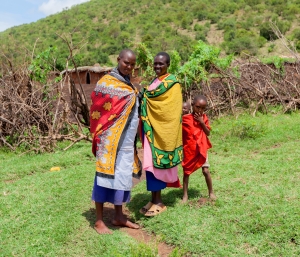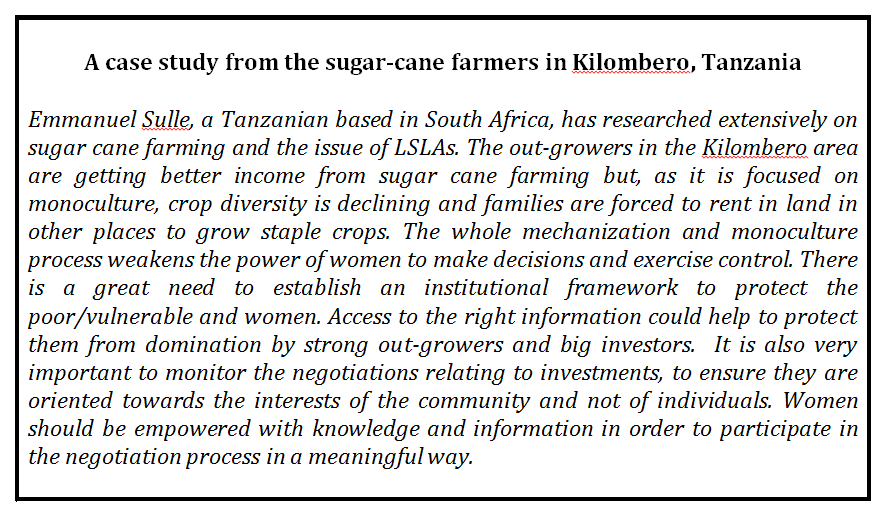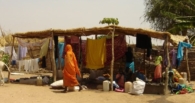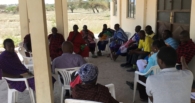Land Tenure Security and LSLAs
Strategic empowerment for women?
Roman Moges Asefaha
2 August 2016
/
- 0 Comments
When we talk about gender equality, the empowerment of women – in all aspects: economic, political and social – is an important foundation which cannot be ignored. Addressing the underlying strategic issues around women’s empowerment is much harder and more complex than addressing practical needs like women’s access to drinking water, health services and so on. But why is it so hard to address strategic gender issues? Is it because it requires a change of attitude and a real and meaningful commitment from policy makers and politicians? Is it because of resistance from elites due to deep-rooted cultural traditions? Is it because we do not have the right approach to dealing with strategic gender issues? Is it because of a lack of justice and good governance? I do not want to deny the importance of addressing immediate practical or basic gender needs, as this has a significant impact on reducing the burdens on female family members and improving the quality of family life. However, when it comes to the broader effects on women’s empowerment, addressing basic needs makes less of a change to their status in their family and community. More fundamental change can come from addressing strategic issues around land tenure security.
For rural communities, whether they are pastoralist or agriculturalist, land is an important resource that enables community members to build their livelihoods. Though not always well recognized as such, women are the main actors when it comes to working on the land to support the livelihoods of their families. Despite their significant contributions, women are often in a disadvantaged position when it comes to land ownership and decision-making on land matters. As commercial pressure on land increase, the gender dimensions of land tenure security are changing in ever more complex ways. In particular, the growing issue of large-scale land acquisitions (LSLAs) is changing the situation of women on the ground.
In December 2015, I had the chance to participate on behalf of Mokoro in a workshop on the gender impacts of LSLAs organized by IIED in Zanzibar, Tanzania. Participants included representatives of civil society organisations from both Eastern and Western Africa. It was a learning and experience-sharing event focused on land tenure issues, LSLAs and land governance. When participants presented the land tenure issues in their different countries, I realized that land tenure systems are variable not only from country to country but also from community to community within the same country. To mention some examples of the different situations that came up:
- In Ethiopia and Mozambique, the government owns all the land and the people (both men and women) only have user rights. They can bequeath these user rights to their children, but they cannot sell the land. But even with these equal land and inheritance rights, women are not necessarily benefitting from the land to the same extent as men. I remember my own experience from Northern Ethiopia, where it is taboo for a woman to plough her cropland. This taboo prevents many female-headed families from using from their own land and therefore it is important that this issue is addressed. I have personally witnessed how, with the right strategy and approach, the taboo can be broken and women can be encouraged to start ploughing their own croplands.
- In Kenya, Tanzania and Uganda, the land tenure laws divide the land into different categories, such as community land, public land or private land. In these Eastern African countries, the governments also recognize customary land tenure systems in respect of some categories of land.
- Patriarchal traditions in Africa are often criticized for being gender- discriminatory and one of the reasons why women can face difficulty in accessing land. But experience from some Western African countries like Togo, Mali and Senegal shows that even in places with matrilineal societies, where the ownership of land is directly linked to the social relations of women, there are injustices during implementation of the laws. In some cases in Western Africa, women can only acquire land through their husbands.
The case of gender, land rights and LSLAs in Tanzania

Maasai women, Tanzania
The legal system in Tanzania recognizes the land rights of citizens and the government has policies and procedures in place for land acquisitions and investments. In principle, the village councils manage the village land and discuss requests for land for investment at a village assembly. However, a strategic area to work on is ensuring meaningful and active participation of women in both village councils and village assemblies.
Land under communityland management is more vulnerable to investment-related injustices than land that is held by individual people or families. Often, investors target community lands, and in many cases discussions take place just with village leaders, without any involvement of the village assemblies. Women are the most affected by this but are discouraged from defending their land rights. There is thus a contradiction here, and a gender gap which needs attention. Moreover, the processes around land investments are not very transparent and are open to corruption. Recently, with the support of the British, Danish and Swedish governments, the Government of Tanzania has launched a Land Tenure Support Programme in pilot areas to address some of these current challenges within land administration.
Women and the marginalized are very much affected by the increasing number of issues around LSLAs, but it is implementation of the policies towards land and investment that is the main challenge. Governments and local authorities are not held accountable for their failure to protect women and the marginalized. More women should be involved in negotiations with investors and in the decision-making processes around land matters. However, experience has shown that their participation is very passive and women often lack awareness and do not have access to the right information. Although women are the main workers on the land, only a few of them manage to legally secure their rights over land. Often this becomes a problem for women during divorce or if their husbands die. The experience of the Tanzanian Women Lawyers Association (TAWLA) in accompanying women in court shows that there is a need for more support in order to ensure women’s land tenure security.
Large-scale investments, if they are introduced and implemented properly, can make a vital contribution to the local community, as well as to the overall economy of a country. However, land laws and policies at national and local levels need to be harmonized for the benefit of women. It is not helpful if governments on one hand give equal property ownership rights to women and men, but on the other hand also recognize discriminatory customary laws.

Women should be involved in all stages of the land acquisition process
In many parts of Africa, processes for land acquisition are not transparent. Often, communities become unstable when rumours arise that their land might be given away to an investor. Such rumours discourage farmers from investing in their land, which has a big impact on their productivity and general sense of well-being.
Unfortunately, it seems that in many African countries, investment-related conflicts are becoming more common. In Tanzania, for example, we can mention the conflicts between pastoralists and agriculturalists in which many people and animals have been killed during the past years. As pastoralists are pushed out by investors from the vast pasturelands of central Tanzania, they have moved towards the coastal areas and started occupying agricultural land, and conflicts start to grow. Women are usually the most affected during these situations of conflict. An inclusive development model could be a sustainable solution for the investor and the community to be in a win-win situation. But it should be carefully assessed and it is important to monitor whether the strategic issues and priorities of women are properly addressed.
In particular, I want to stress the importance of engaging all members of the community (female and male) in all the stages of any investment process. Women should be equally represented during the entire process of negotiation and discussion. Some governments are indeed trying to include women. However, in many African countries, women traditionally do not dare to raise their voices and tend to speak less in front of men. Moreover, as the investment process is usually time-consuming, women are generally not involved in every meeting, particularly when decisions are made. So women have less access to the right information and are therefore often in a weak position during the negotiation. There is a great need to strategically empower and equip women with necessary information and knowledge on land issues so they can play a more active role in this process.
In conclusion, the issues of gender in relation to LSLAs are complex. In some cases there is a need for a new law/rule; and in other cases the law/rule exists, but is not harmonized with other legislation, or its implementation is a problem. As societies across and within Africa differ from each other, there is also a need to study the practices, norms and traditions of a specific society. It is equally important to assess the knowledge of women on their legal rights. Quite a number of NGOs and CSOs are engaged in supporting women to protect their land and property rights. This support should continue in a more coordinated way in order to bring more meaningful change to the empowerment of women.
In view of the growing impacts of land investments, governments should review and update gender policies with regard to LSLAs and land use by extractive industries. CSOs can help communities to fight for the enforcement and implementation of national laws at local level, but the government should play a coordination and facilitation role. Lastly, networking and coalition building at the country and at the African level is important. There are some good experiences, which should be shared across the continent. IIED’s Zanzibar workshop provided an excellent opportunity for this kind of experience sharing and I was very pleased to have the chance to meet with and learn from people from different countries and organisations working on these important issues.
You must be logged in to post a comment.



